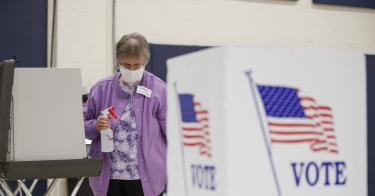What is the best way to conduct elections in a time of epidemic? The simplest and most obvious answer might appear at first glance to be voting over the internet—via email, fax, blockchain or smartphone apps.
While this would certainly seem to fit with our internet-dependent lives as we socially distance, online voting is not a viable or acceptable solution and must not be on the table.
No method of casting ballots over the internet is safe, secure or trustworthy. Period. Votes can be manipulated or changed, recorded and spied on, deleted or cast fraudulently through hacking, viruses, Trojan horses, and other types of malware. The even bigger danger is that these sorts of attacks could succeed and go completely undetected, imperiling the integrity of the election process.
Computer security experts insist that online voting is far too insecure to be used for public elections. In 2011, the National Institute of Standards and Technology warned that “malware on voters’ personal computers poses a serious threat that could compromise the secrecy or integrity of voters’ ballots.” Moreover, the U.S. “lacks a public infrastructure for secure electronic voter authentication.”
The report concluded that the substantial challenges to the privacy, and integrity of online voting could not be overcome, thereby making secure online voting not yet feasible.
Five years later, officials at the Department of Homeland Security repeated this warning, saying that large-scale online voting would introduce “great risk into the election system by threatening voters’ expectations of confidentiality, accountability and security of their votes.” It would also provide “an avenue for malicious actors to manipulate the voting results,” they cautioned.
Two more years later, the National Academies of Science, Engineering, and Medicine found no improvement in the situation. “No known technology can guarantee the secrecy, security, and verifiability of a marked ballot transmitted over the Internet,” its report concluded.
Proponents of online voting often argue that because we regularly conduct banking and shopping online, we should vote online. However, the history of online banking and shopping only proves just how risky online voting would be. Every year billions of dollars are lost to online theft, cyberfraud, and malicious hacking, despite huge sums invested in trying to secure those systems. Financial institutions can (and do) factor the expected level of fraud into the cost of doing business, but we can’t do that with elections. We can’t say we can accept election results marred by a certain percentage of fraud.
Furthermore, if fraudulent banking charges are made, consumers have the opportunity to find it through their banking and credit card statements. You can tell if someone has taken money out of your account or if you’ve been charged for an item you never ordered or received.
But there is no reliable mechanism available for a voter to confirm that the secret ballot was cast and recorded correctly after it was transmitted over the internet. Conversely, election officials can’t check back with the voter to ask if the ballot has been altered. This is why online voting is especially vulnerable to undetectable hacking; if ballots are corrupted in transit or through undetectable malware on the voter’s home computer, there’s no way to know.
Finally, it’s difficult, if not impossible, to provide a reliable way to authenticate voters over the internet to ensure criminals or bots are not casting fraudulent votes.
We will get through this difficult time, and it’s critical that our elections go forward providing all voters the opportunity to cast a trustworthy and secure ballot. We may not agree on many other policies on voting, but we can agree on this: online voting is not the answer.
This piece originally appeared in The Washington Times



